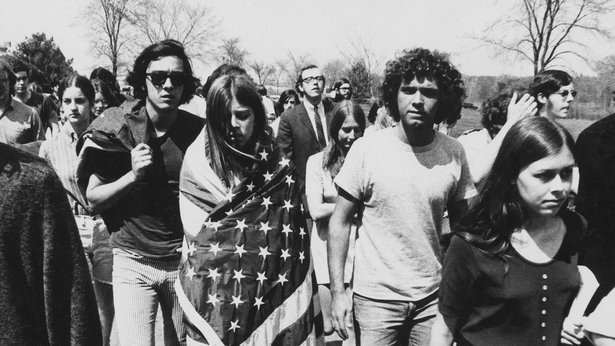music as social action ::
the Blog
|
As we approach the 1960s in America and zero in on how pop music connected with the issues of the era — as well as why the imagery of the ’60s protest singer has wielded certain power over later generations of musical protest — there are countless sources of literature and documentary film attempting to summarize and contextualize that particular social scene. Notably, famed documentary filmmaker Ken Burns' latest multi-part installment: The Vietnam War. The 10-episode series aired via PBS and is available currently to watch on Netflix. For our immediate situation, it may be of interest to examine what music not only was chronicled by the documentary but was used on the film's soundtrack itself. To that end, PBS previously compiled some Spotify playlists of the music featured in each episode. In addition, music journalist David Fricke has written liner notes for the series' soundtrack, which can be read here. In this text — which covers and comments on an impressively wide variety of music, some of which we've discussed thus far — Fricke pushes some well-traveled discourses about how rock music was inextricable from the experience and understanding of the United States' involvement in that war, even going so far as to claim that "Vietnam was the first rock & roll war." Note, too, the way Fricke discusses the double-natured communication of some songs, specifically the way a cover by another artist (from another social group) changes and/or adds layers of meaning to the original — as we've begun to examine. Also, this consideration of music during the Vietnam war may be of interest, especially the author's initial comparison of music written and utilized during WWI and that during the Vietnam war, how each worked to foster unity in certain ways. Participation! In the interview with Theodor Adorno that we watched, he says that a protest song about the Vietnam war is unbearable — not based on a musical criticism but because, in his view, something as serious as a war should not be trivialized as a pop-culture commodity. How might he react to someone referring to the conflict as a "rock & roll war"? What work is being done — and on behalf of whom — when a war is framed in this way?
5 Comments
Victoria Woollett
4/26/2019 03:18:50 pm
I think Adorno would refuse to believe that it is a "rock & roll" war, purely based off of what he said in the interview. But, when framed this way, it is on behalf of those protesting the war who don't have as strong of a voice or following as a musical artist.
Reply
Elvina A
4/28/2019 09:50:31 am
If Adorno were still alive, I think he'd change his viewpoints when he saw the impact these songs have on some peoples' lives. However, if this were to have happened in his day and age, he'd probably say that this is all bonkers.
Reply
Casey Longstreet
4/28/2019 01:34:00 pm
If Theodor Adorno heard of someone referring to the Vietnam War as a "rock & roll war" he most likely wouldn't be too fond of that title. However, when the war is referred to in this way, it describes how people, especially in the United States, came together to fight back against the war. While rock & roll music wasn't the most traditional way to protest back then, the Vietnam War changed that as people utilized this medium to let their voices be heard. After seeing the positive impacts of bonding people together through music during the war, I'm sure Adorno would react differently than he originally expressed.
Reply
Edric Orta
4/28/2019 08:26:22 pm
I believe Adorno would still believe that that it would be a sickening term to be used since it is likening the horrors of war to such a cultural commodity. Judging on Adorno's view of music being a cultural commodity that manipulates the population, he would state that the 'war on rock and roll' would basically be downplaying war on a completely new level. When a war is framed this way, the work being done is shifting the population to view war as a completely different thing than what it actually is, which is done on behalf of the protesters by the musicians.
Reply
Rachel Hungerford
4/29/2019 03:48:19 pm
Adorno would not like the term "rock-and-roll war" because it trivializes the war. Being a rock-and-roll war meant that teens and young adults who regularly listened to this music were able to get more involved in and know more about the war because rock and roll was their news source. Information about the war was being spread by young people to young people through this music and this made young people get more involved in and more political about the war. This is why the war was being framed this way: for the first time young people were informed about and making political statements about the war and expressing those opinions through their news outlet which was rock and roll music
Reply
Leave a Reply. |
COMM 113T
|

 RSS Feed
RSS Feed